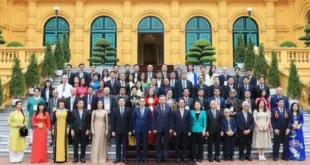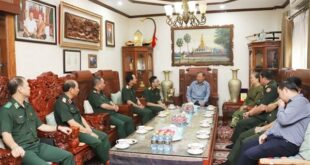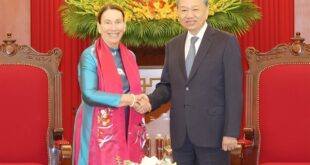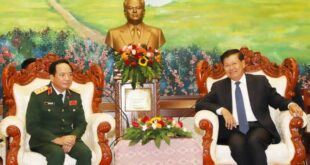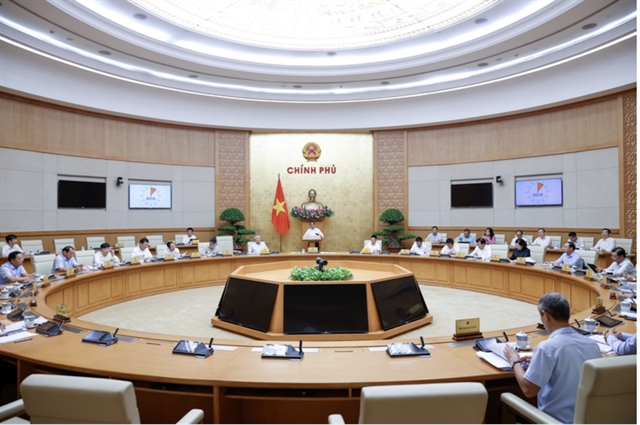 |
| The meeting of Government discussing draft laws on August 27 in Hà Nội. VNA/VNS Photo |
HÀ NỘI – It is necessary to continue to innovate the approach to legislative work in the direction closely sticking to reality and respecting objective reality, said Prime Minister Phạm Minh Chính.
The Prime Minister yesterday chaired a special Government meeting on legislative work, discussing and providing opinions on three draft laws: the amended Law on Management and Use of State Capital in Enterprises, the Law on Teachers, and the Law on Digital Technology Industry.
PM Chính stated that this meeting aims to continue implementing one of the three strategic breakthroughs identified by the 13th National Party Congress, which is to supplement and complete the institutional framework, remove difficulties and obstacles and unlock resources for development.
He emphasised the need to continue innovating the approach to legislative work in the direction of closely following reality and respecting objective reality.
The issues that are clear and have been proven to be correct by practice, with the majority agreeing and effective implementation, must be legislated, while the issues that are not yet mature or clear must be piloted to learn from experience and avoid perfectionism and haste, PM Chính told the meeting.
According to the Prime Minister, the draft laws being reviewed at this meeting are all important contents arising from practical requirements. Among them, the drafting of the amended Law on Management and Use of State Capital in Enterprises aims to better manage state capital in enterprises, while also removing obstacles and promoting the resources and assets of the state for development.
The Law on Teachers aims to improve the quality of the teaching staff, meeting the requirements, tasks and mission of educating the people in new conditions, with the perspective that “teachers are the motivation and inspiration for students”.
The Law on Digital Technology Industry will create a legal framework to promote development while ensuring state management in the field of digital technology industry.
At the meeting, the Government listened to the summary proposals and the report on receiving appraisal opinions and discussed policy contents in the draft laws.
Discussing the Law on Management and Investment of State Capital in Enterprises which is compiled by the Ministry of Finance, the Government members focused on the scope of regulation, applicable subjects, regulations related to the transfer of the Development Investment Fund, inspection, auditing and supervision work, as well as state management functions and the functions of representing state capital ownership.
Regarding the Law on Teachers drafted by the Ministry of Education and Training, the government agreed on the need to continue refining regulations related to teachers, inherit regulations that have been proven effective in practice and supplement regulations to address inadequacies and obstacles arising in practice.
For the Law on Digital Technology Industry drafted by the Ministry of Information and Communications, the discussions concentrated on several issues such as mechanisms for projects of a special large-scale nature, authority to approve controlled experimental mechanisms, the relationship of the draft law with related laws and the management of artificial intelligence.
The Prime Minister called for adherence to and full institutionalisation of the Party and State’s guidelines and policies on related issues which should closely follow and clearly reflect the policies approved by the Government in proposing law construction.
Efforts should be made to promote decentralisation and empowerment, allocate resources appropriately, enhance execution capacity, design tools to strengthen supervision, inspection and control of power, intensify post-audit, clearly define responsibilities, tasks, products and streamline administrative procedures, eliminate “ask-give” mechanisms and reduce intermediaries, he said.
State agencies should focus on implementing state management tasks, including formulating strategies, plans, regulations, policies, legal corridors, standards, criteria and tools for supervision and inspection, conducting preliminary and final reviews, rewarding and disciplining, he said.
It is essential to enhance tight, effective coordination among ministries, sectors, and agencies. Establish appropriate preferential mechanisms for sectors that need encouragement, drawing on international experiences suitable to Việt Nam’s conditions, circumstances and economic affordability.
“The policy mechanism must be open and feasible but controllable. There must be suitable, effective policies for training and developing a high-quality workforce in the three areas covered by the three draft laws, mobilising all lawful resources for national development,” the PM said.
As these laws contain many new and challenging contents, the Prime Minister requested that the ministers establish working groups involving experts and personnel from various ministries, sectors and agencies.
They need to continue to listen to experts, scientists and affected subjects, closely coordinate with the National Assembly’s agencies, conduct effective communication and assign deputy prime ministers responsible for specific areas to oversee and directly direct the completion of the draft laws, ensuring progress and enhancing quality. VNS
- Reduce Hair Loss with PURA D’OR Gold Label Shampoo
- Castor Oil Has Made a “Huge” Difference With Hair and Brow Growth
- Excessive hair loss in men: Signs of illness that cannot be subjective
- Dịch Vụ SEO Website ở Los Angeles, CA: đưa trang web doanh nghiệp bạn lên top Google
- Nails Salon Sierra Madre
 VnExpress News The News Gateway of Vietnam
VnExpress News The News Gateway of Vietnam
